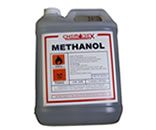

|
Methanol
Methanol, also known as methyl alcohol, wood alcohol, wood naphtha or wood spirits, is a chemical produced in a catalytic industrial process directly from carbon monoxide, carbon dioxide, and hydrogen.
Methanol is the simplest alcohol. It is a light, volatile, colorless and flammable liquid with a distinctive odor very similar to that of ethanol (drinking alcohol). However, unlike ethanol, methanol is highly toxic and unfit for consumption.
At room temperature, it is a polar liquid, and is used as an antifreeze, solvent, fuel, and as a denaturant for ethanol. It is also used for producing biodiesel via transesterification reaction.
Because of its toxic properties, methanol is frequently used as a denaturant additive for ethanol manufactured for industrial uses. The largest use of methanol by far is in making other chemicals. About 40% of methanol is converted to formaldehyde, and from there into products as diverse as plastics, plywood, paints, explosives, and permanent press textiles.
Other chemical derivatives of methanol include dimethyl ether, which has replaced chlorofluorocarbons as an aerosol spray propellant, and acetic acid. Dimethyl ether (DME) also can be blended with liquefied petroleum gas (LPG) for home heating and cooking, and can be used as a diesel replacement for transportation fuel.
Methanol is used as a solvent, and as an antifreeze in pipelines and windshield washer fluid. It is also useful as an energy carrier. It is easier to store than hydrogen, burns cleaner than fossil fuels, and decomposes to water and carbon dioxide if spilled.
For additional information and documents about Methanol or how we can supply your organization, please give us a call, send us an email or contact us here: |
|
|

